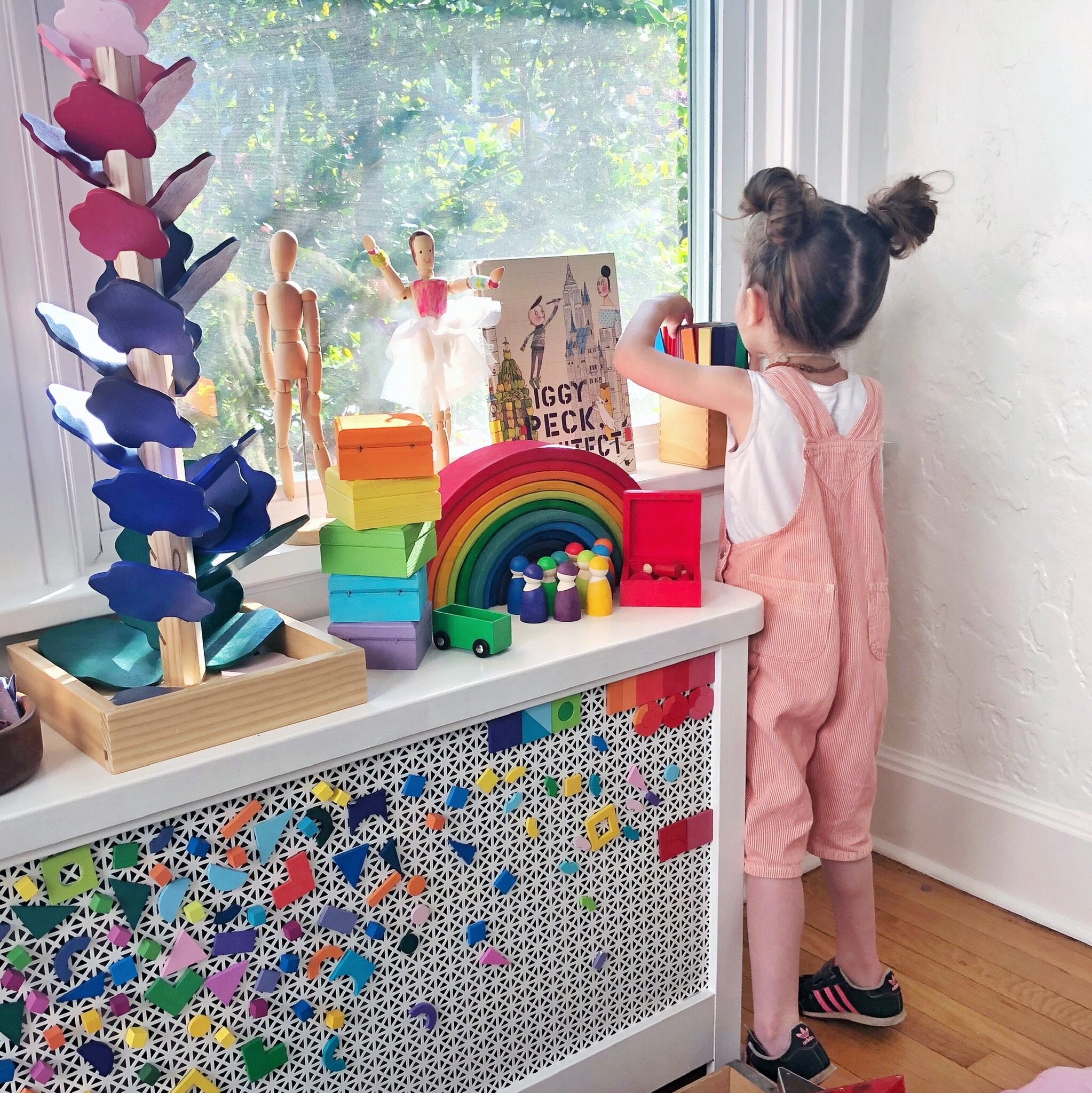If Your Kids Won’t Cooperate, It Might Be More About You Than Them
/It's Thursday afternoon in 2019, and my seven-year-old daughter's art class starts in 20 minutes. I've been rushing around to make sure she’s eaten a snack and changed her clothes. I've found the portfolio she needs to bring back that somehow migrated under the couch. The car is running, I've got my water in hand, and I call out cheerfully: "Time for art, let's go!"... silence.
I call again, this time with that edge in my voice that says we're now on a timetable. Still nothing.
When I find her, she's sitting on her bedroom floor engrossed in a block building, surrounded by colored blocks and small animals. Oh, and she's taken off the clothes I carefully laid out and replaced them with her dress-up clothes and sparkle sandals.
The clock is ticking. My neighbor’s text buzzes on my phone, asking if we are still picking up her daughter for class. My 6-year-old looks up at me with those big innocent eyes and asks, "Can I have a snack first?"
My patience snapped. “You already had a snack, and if you don't come right now," I warn, "there will be no park visit this weekend."
Her lower lip trembles. "But you promised about the park!"
"Well, that's what happens when you don't listen. Now, let’s go.”
Five minutes later, we're in the car, both miserable. She's pouting. I'm regretting my harsh words.
Why is it that the one moment we need kids to cooperate, they do the exact opposite?
If you’re anything like me, you take shortcuts when you’re feeling pressed. A lot of the time, that’s a great strategy.. But when it comes to kids and cooperation? It doesn’t work.
Here are a few reasons our knee-jerk reactions to getting kids to cooperate won’t work, and what to do instead:
Threats, Bribes, and Punishments? Not a good long-term strategy…
One common mistake lots of parents (myself included) make is doing “whatever works” in the moment to get their kids to comply. I still catch myself doing it sometimes. Old habits die hard.
If it gets them from point A to point B? Why not?
All three are external motivators, and they are rooted in fear tactics.
Here's the problem: While threats, bribes, and punishments might work in the short term, they undermine what we're trying to achieve - raising children who make good choices because they understand why those choices matter, not because they're afraid of consequences or only motivated by rewards.
What happens when we rely on these tactics:
Children learn to behave only when someone is watching
They become dependent on external rewards rather than developing intrinsic motivation
They miss opportunities to learn real problem-solving skills
The parent-child relationship becomes based on power struggles rather than trust
These approaches often require escalating consequences
So many of us, myself included, were raised this way and it makes sense that our own internal wiring would take us back there when raising our own kids.
So, what can you do instead?
When you feel yourself getting frustrated and starting to bark orders (hi, it’s me!), try to remember that young children live in the present moment and have vastly different priorities than adults.
Understanding Your Child's Developmental Stage
Cooperation looks different at each age. Toddlers (2-3) live in the present moment, respond to simple one-step directions, and use "no" as a healthy expression of autonomy rather than defiance. Preschoolers (4-5) can follow short sequences, are motivated by helping and belonging, and benefit from limited choices. Early grade-schoolers (6-8) understand cause and effect, can manage complex routines with reminders, and respond well to being involved in decision-making. Remember that, like adults, children's cooperation diminishes when they're tired, hungry, or stressed.
General Tips For All Ages
Connect when you communicate. Instead of calling directions up the stairs or across the room, take the extra moment to bend down, get their attention, double-check you actually have their attention, give one direction, and have them repeat it back to you. Try placing your hand on their back or touching their hand while you talk.
Give Fair Warning. Instead of expecting your child to drop what they are doing that instant and comply, give them fair warning and time to finish up their own agenda before they attend to yours. If you are in the middle of an important phone call and your child suddenly starts yelling, “I NEED A SNACK RIGHT NOW!!!,” you’d expect them to wait a minute before you assist them. It’s the same thing…
Involve them in decision-making. Kids are much more likely to cooperate if they know what to expect. If you know tomorrow morning is busy, and that you need to get out the door ahead of time, talk about it the night before. Try this: “Most mornings, we have time for screens after breakfast, before we get ready to leave. Tomorrow morning is different. We have to leave early. Instead of morning shows, we will have afternoon shows. Can you make a sign and hang it near the TV so that in the morning, we will remember? Here are some post-it notes and pencils. Thanks for helping me out!” If your child is younger, try: “This feels different. Usually we do X, and today we are doing Y.”
Reflect: The beauty of parenting is that it offers countless opportunities to try again when things don't go as planned. After a difficult moment, ask yourself: Were my expectations developmentally appropriate? What obstacles could I remove next time? How might I set my child up for success? For example, if the morning routine includes brushing teeth, putting on shoes, and wearing a jacket, consider keeping a toothbrush in the kitchen and laying out clothes and shoes the night before to prevent searching and distraction. Small environmental adjustments can dramatically improve cooperation without confrontation.
We all have those rushed mornings and frazzled afternoons when we fall back on old patterns, and that's okay. Something I’ve always said to my kids is this: "You are still learning how to be a kid and I am still learning how to be your mom. It's okay if we mess up sometimes."
Looking back at that art class afternoon, what if I had bent down, acknowledged her block creation, and given her a clear one-minute warning? What if I had laid out her art clothes earlier or brought the snack in the car? Most importantly, what if I had simply said, "I'm sorry for snapping" when we got in the car?
When you lose your cool (and we all do), take a breath, reconnect, and try again. Your child isn't keeping score, and hopefully, you aren’t either.
I hope you enjoyed this blog! If you want to keep up with more Workspace for Children content, follow along on Instagram by clicking HERE.
Want To See More Blogs Like This One? Great! Check Out The Posts Below!
Guess What?! My Substack is in the top 100 Best-Seller List for Parenting!! Thank you so much for being a part of TWFC community where we acknowledge that parenting can be hard and getting kids back to play can be tricky, but we are willing to work at it because it matters. You don't have to overhaul your parenting. Small, intentional shifts in how we approach play and connection with our children can make a tremendous difference in their development and our relationship with them.
That's why I'm so passionate about sharing simple, practical ideas that honor both your child's needs and your reality as a busy parent. I'm incredibly grateful for each of you who has subscribed, shared, and implemented these play-based approaches in your homes. Thank you for being here. x Lizzie
Looking for a little spring refresher? We’ve got you covered.
Puppy Dress / Staplestein Rainbow / Rainbow Peg Dolls / Expert Tree Climber T-Shirt/ Swim Trunks / Floral Bikini / Natives / 6 Playsilks/ Tub Works Kids Bath Potions / Luggy Basket / Let’s Make Rabbits / Acrylic Gem Cubes/ Personalized Rainbow Craft Kit / Hollow Blocks / See Ya Suitcase / Kids Umbrella/ Piggy Paint / Spring Playdough Jars / Cuddle Twins Lovies / Spring Sneakers







Rescuing them from discomfort also robs them of resilience.